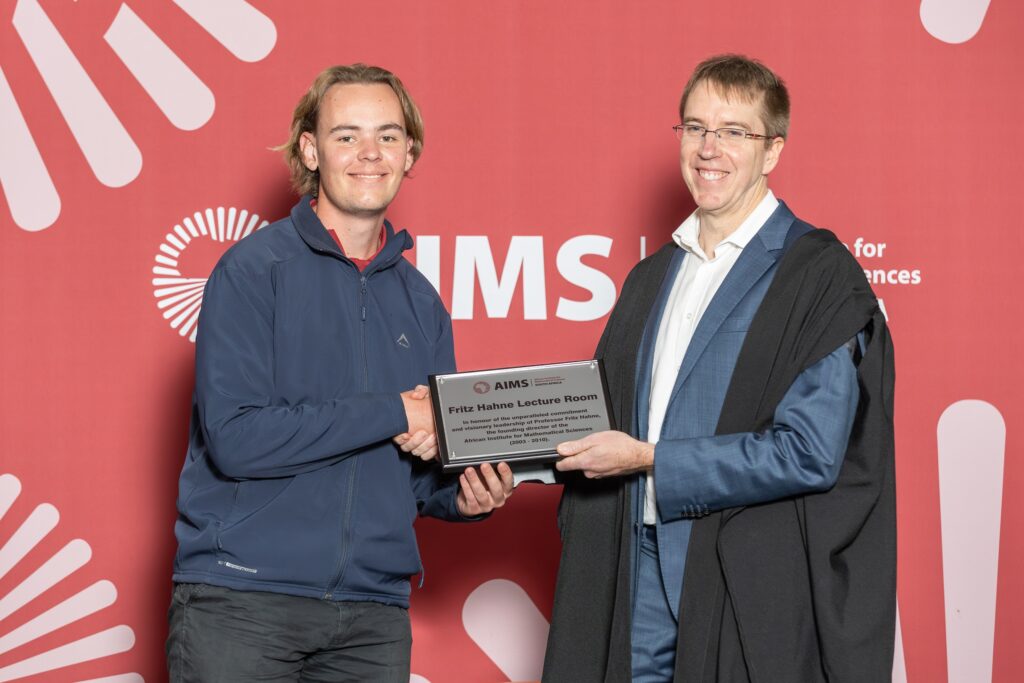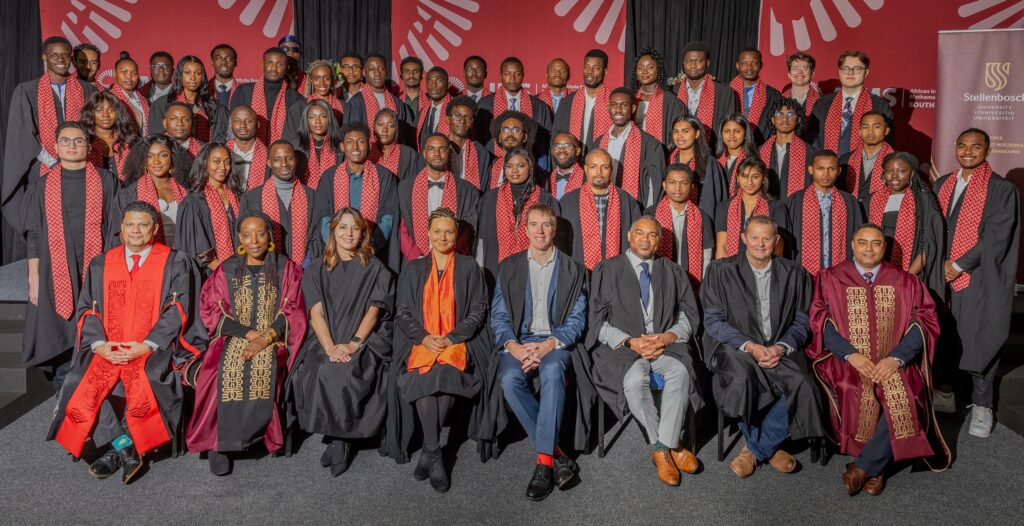The African Institute for Mathematical Sciences (AIMS) South Africa proudly hosted its Recognition of Achievement Ceremony on 17 July 2025, celebrating the accomplishments of the 2024–2025 Master of Science in Mathematical Sciences cohort. The event brought together faculty, families, partners, and honoured guests to recognise a year of academic excellence, scientific exploration, and deep community engagement.
The ceremony opened with a warm welcome from Prof. Ulrich Paquet, Director of AIMS South Africa, who paid tribute to the collective ethos of the Institute. “Education is a powerful weapon, one that AIMS believes can be used to change the world. That is the bedrock of AIMS,” he said. Reflecting on the spirit of the year, he added, “This year, I learned something profound from all of you. We are an institute that operates as one team.” He thanked students and staff for their commitment and unity, from classrooms to community projects, and extended sincere appreciation to AIMS South Africa’s long-standing academic partners, the universities of Cape Town, the Western Cape, and Stellenbosch, as well as Google DeepMind, whose continued support of the AI for Science programme has helped expand AIMS’ academic vision.
Prof. Karin-Therese Howell, Academic Director for the Structured Master’s Stream, offered a poetic message: “Your life sends waves into the world – now go and make an ocean rise.” Echoing this spirit, Prof. Claire David, Academic Director for the AI for Science Stream, praised the resilience and autonomy st
At the ceremony, 62 students were awarded certificates of recognition, including 18 women, representing 15 different African countries. With this milestone, AIMS South Africa has now graduated 1,151 students from 42 countries across the continent, a growing network of young scientists united by a shared commitment to mathematical excellence and Africa’s transformation.
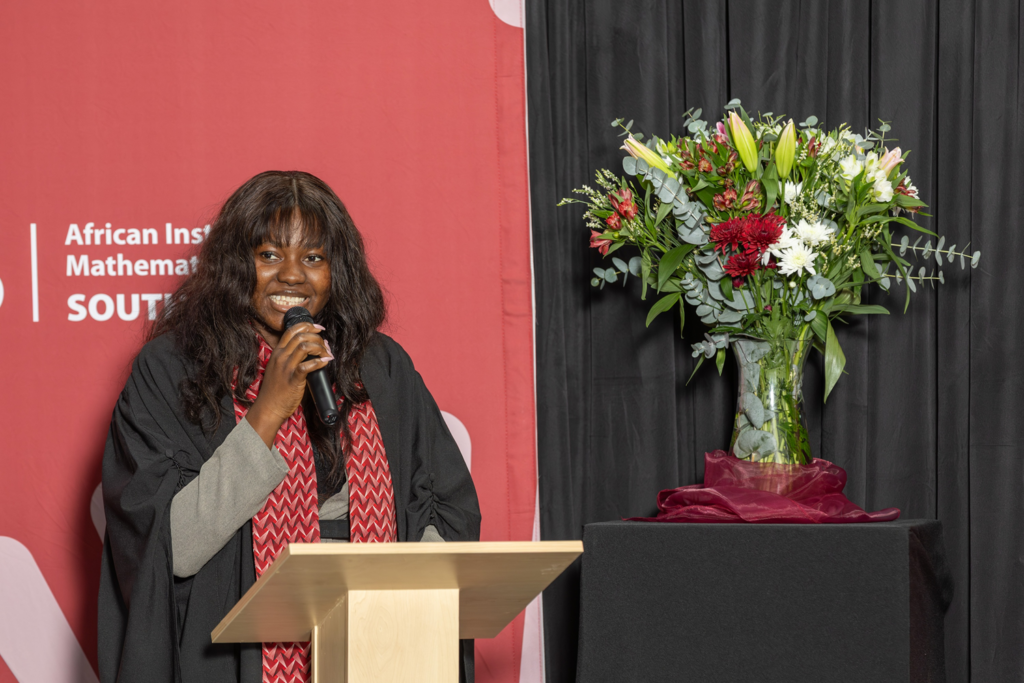
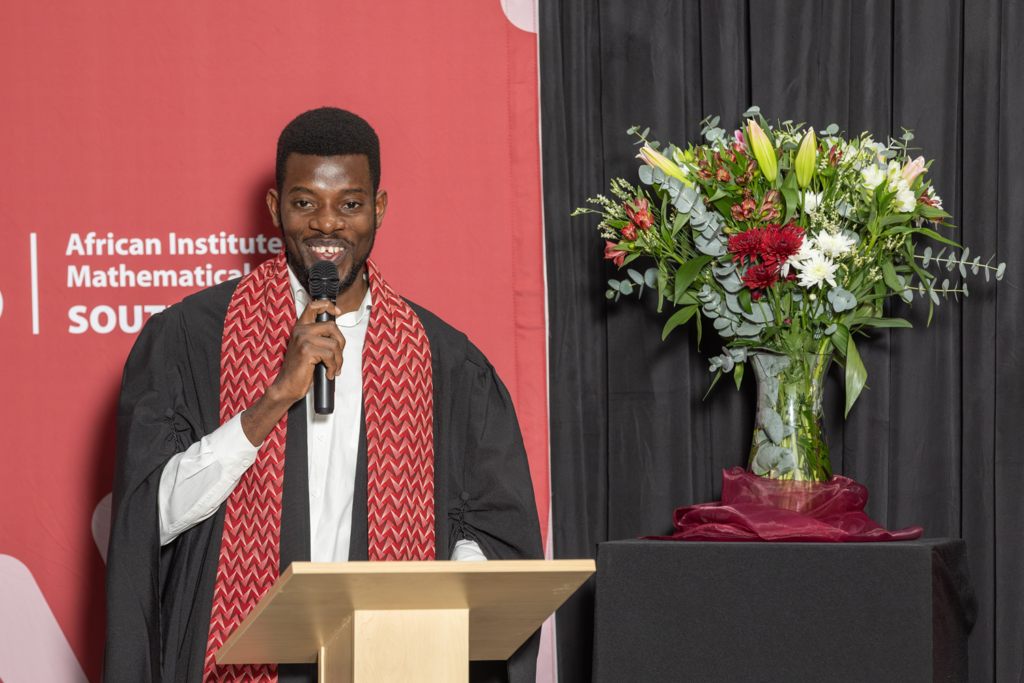
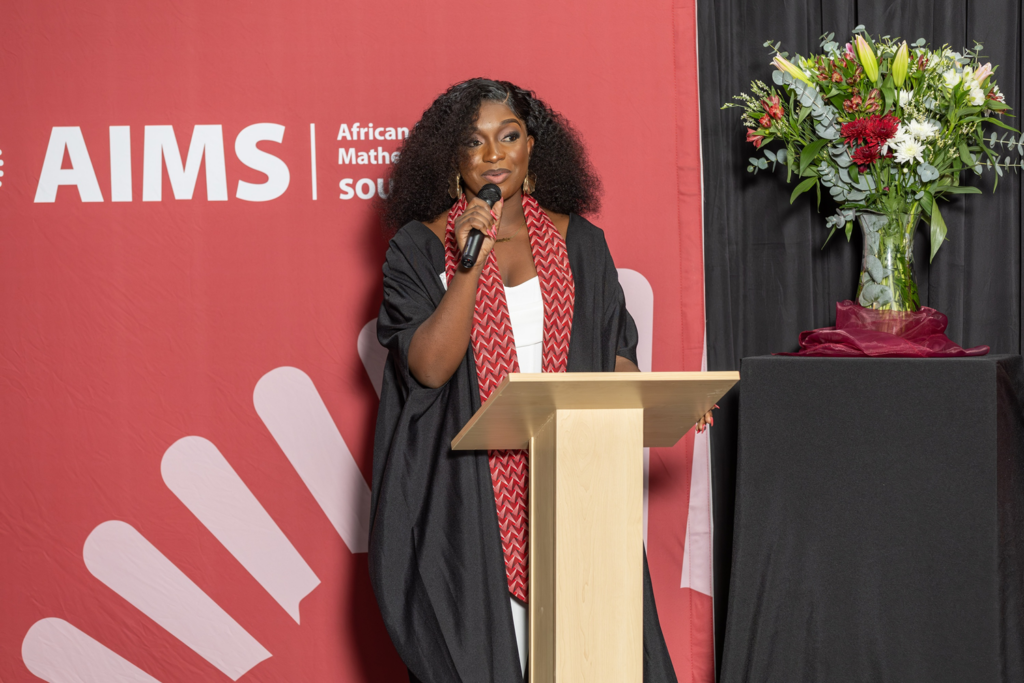
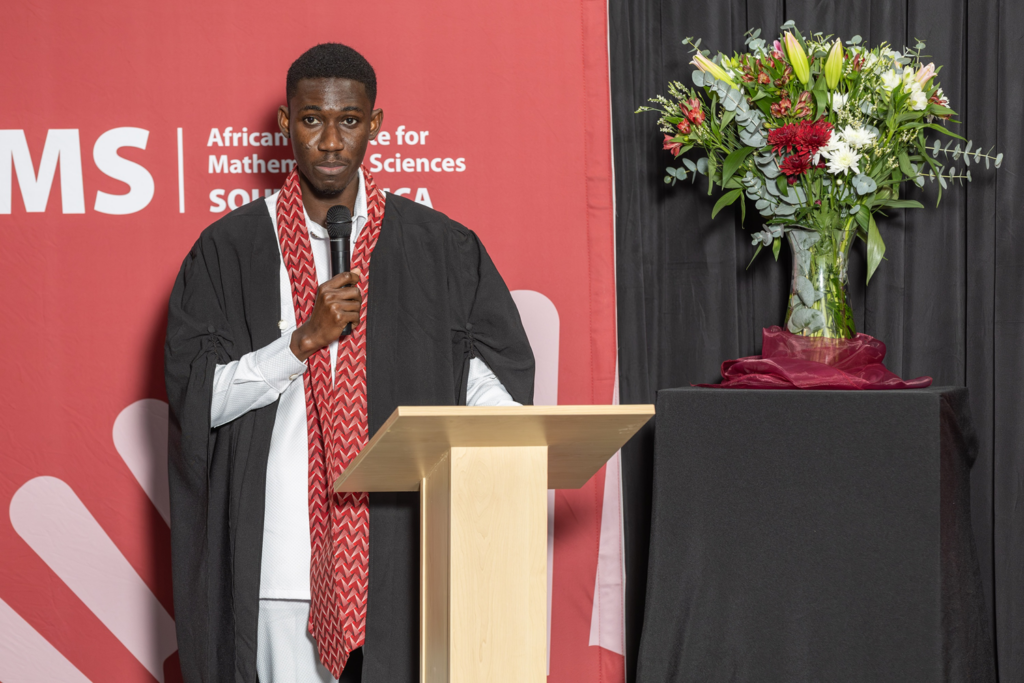
Student speakers offered heartfelt reflections on their time at AIMS. Mercy Newyear and Clinton Paye Quee spoke of the challenges they faced, the deep transformation they experienced, and the power of community. “Many of us thought we wouldn’t survive the first month,” said Mercy. “But we kept showing up, because we knew this journey was changing us.” Clinton added, “Magic truly happens at AIMS. We are standing on better ground.” Together, they celebrated the diversity that made their experience so rich,through shared meals, debates, laughter, and late-night deadlines. “Through our diversity, we discovered our strength,” Mercy reflected. “And now it’s time to serve, to give back, uplift and inspire.”
Further reflections were shared by Rumbidzai Michelle Gwinji and Emmanuel Kwame Ayanful, who each offered powerful messages shaped by their journeys. Ruby reminded her peers of their strength and perseverance: “We are capable of doing hard things, because we have done them already.” Emmanuel emphasised that Africa’s future rests not only on innovation, but on unity: “It will be defined by our ability to work together.” Their words underscored the personal transformation and collective purpose that define the AIMS experience.
The ceremony also celebrated students’ voluntary contributions to science and community outreach and education through AIMSSEC and the House of Science. These programmes bring mathematical enrichment and scientific communication training to underserved communities, and student involvement reflects AIMS’ deep commitment to social impact alongside academic rigour.
This year’s top academic performers were also honoured for their exceptional achievement. In the AI for Science Stream, awards were presented to Oussama Hidaoui, Omer Kamal Ali Ebead, Ayman Saeed Mohamed Saeed, and Asim Awad Hussein Osman. In the Structured Master’s Stream, the top achievers were Cedric Pizina, Aniska Zephrina Be, Dinaniaina Rafidimanatsoa, and Ruth Naayi Odankey Abbey.
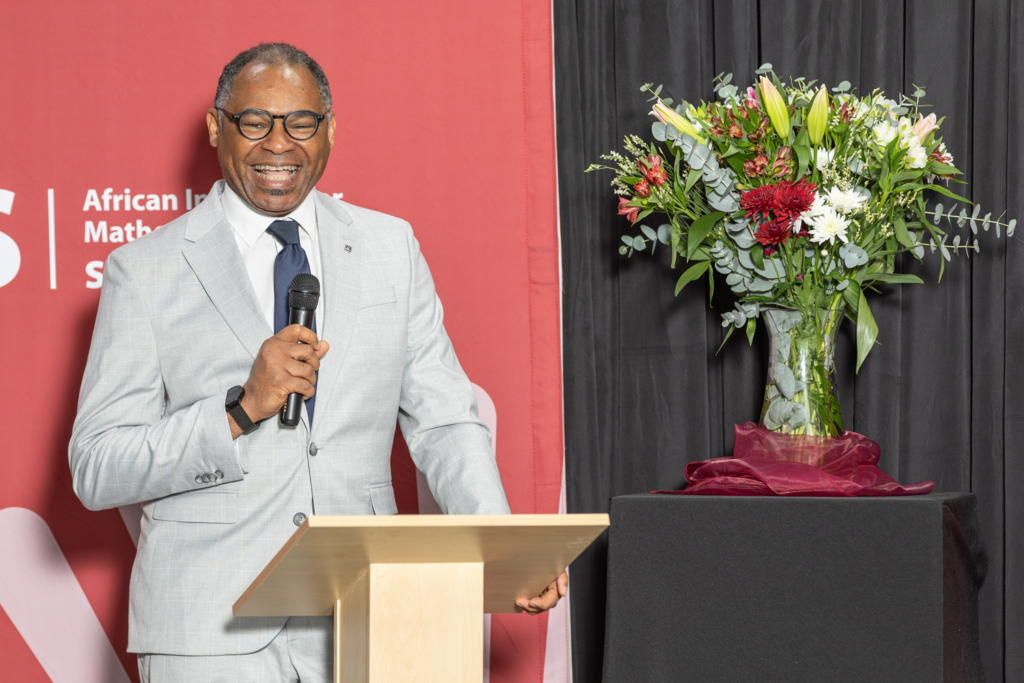
The keynote address was delivered by Dr Brando Okolo, Head of Science, Technology and Innovation at the African Union Development Agency – NEPAD. In a rousing message to the graduating class, he spoke of the vital role young scientists must play in Africa’s future. “Africa doesn’t need charity,” he said. “It needs partners. Innovators. Encouraging thinkers. People like you, who can leap, not just catch up.” He praised the graduates’ ability to bridge technology with social context, describing them as builders of inclusive solutions, informed by lived realities rather than theory. “Your understanding of inequality, your ability to bridge technology and context, make you uniquely positioned to solve access problems from within,” he said. “You build differently. You build inclusively.”
Dr Okolo challenged the cohort to reimagine their potential not just as job-seekers, but as job-creators, researchers, entrepreneurs and leaders shaping the very direction of innovation on the continent. “When I look at this graduating class, I see the generation that will compete globally with confidence, build homegrown solutions using frontier technologies, and craft new successes for Africa.” He reminded them that their stories are still being written. “The real question isn’t whether you’ll be ready for 2050. It’s whether 2050 will be ready for you.”
He closed with a powerful invitation to action: “The world is watching. Go out and build, not just a career, but a continent of possibilities.” His words left the audience energised and affirmed the transformative vision at the heart of AIMS.
In a moving final gesture, the ceremony concluded with the dedication of the Fritz Hahne Lecture Room, named in honour of the first Director of AIMS. “AIMS was the pinnacle of my professional life as a scientist and an educator,” Prof.Hahne once wrote. After retiring as Dean at Stellenbosch University in 2002, he volunteered his time to help shape the Institute in its formative years. His grandson, Mr Theo Feucht, was invited to unveil the dedication on stage.
This memorable celebration of talent, resilience, and purpose reminds us that the future of mathematical sciences in Africa is not only bright – it is in good hands.
